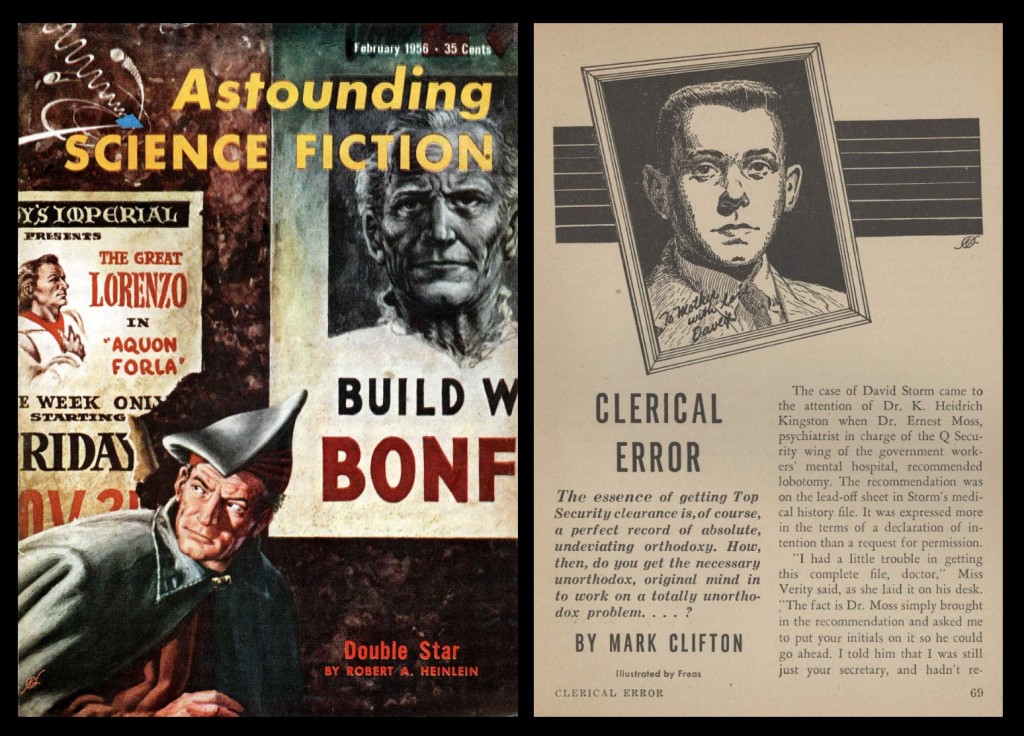
“Clerical Error” was first published in Astounding Science Fiction, February 1956. You can read it on Archive.org. It is story #3 of 22 for The Best SF Stories of 1956 group read. I selected “Clerical Error” for our best SF stories of 1956 group read because Asimov and Greenberg, and T. E. Dikty selected this story for their best-of-1956 anthologies, and Judith Merril listed it in her anthology for 1956 as an honorable mention.
The only significant anthology that reprinted the story was Neglected Visions (1979) edited by Barry Malzberg, Martin H. Greenberg, and Joseph Olander, whose goal was “an attempt to restore the reputations of eight writers who did not achieve the recognition they deserved.” “Clerical Error” was also reprinted at SciFiction.com in 2002, an early internet effort to reprint classic science fiction online. Barry Malzberg also edited The Science Fiction of Mark Clifton back in 1980. Long out of print, but copies are available on ABEbooks.
In other words, “Clerical Error” has its fans who have tried to save it over the years, but the first time I read it, I found the whole beginning muddled, too full of info dumping. This time I also found the first part impenetrable and stopped reading. I then gave it a rest and started researching the story online. I could tell Clifton was trying to do several things at once in the first half of the story. He was setting up the much simpler second half, but he was also using the story to expound on science, scientists, and the perception of science, among other things.
Clifton also worked hard to develop his characters, and convey them psychologically, and even have us understand the psychological understanding of the psychiatrist. But this requires close reading.
I then read Barry Malzberg’s introduction to “Clerical Error” where he gives us some background on Mark Clifton. After reading that, and thinking about what I had read so far, I went back and started the story for a third time. For some reason I was in the right mood, and I zoned in on what Clifton was doing. This time the story worked great. Here’s Malzberg’s introduction.
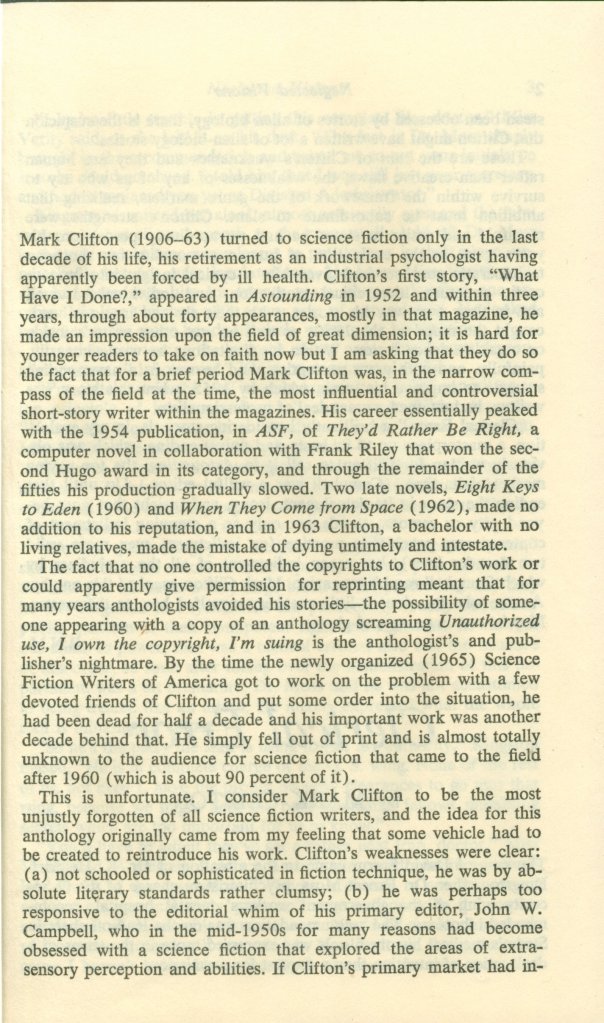
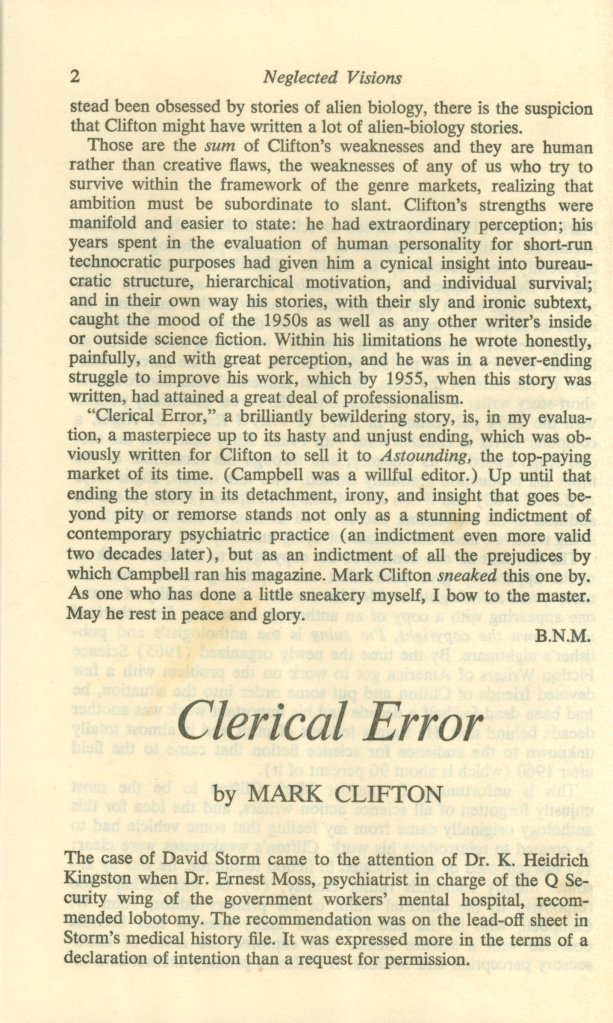
I really wanted to hear this story too, but I couldn’t find any audiobook narration of the story. I even downloaded a pirated copy of a Mark Clifton collection in .pdf format and loaded it into the Edge browser which has a very good text to speech function. It works to a degree, but ultimately, I had to give up.
The story’s set up involves a scientist, David Storm, going insane. Because Storm works for the government in a high security job, the government doesn’t want to release him to outside doctors. He babbles about technology that will change the world. Dr. Ernest Moss, the psychiatrist with security clearance in charge of Storm requests that Storm be given a lobotomy. Dr. Kingston, the psychiatrist administrator over Dr. Moss doesn’t want to allow the lobotomy until he understands the case, but he doesn’t have top level security.
Dr. Kingston tries several end-runs around bureaucracy desperately to save Storm. Each step gives Clifton a chance to pontificate about science versus the government. Since Malzberg points out that Clifton was an industrial psychologist, this means his insights have some weight.
One reason why the story is so hard to get into is it digresses in so many directions. Clifton focuses on Dr. Kingston and his secretary Miss Verity. She is the top secretary in the psychiatric division, and Clifton represents them as the two most powerful people in the story. Miss Verity has a mind of her own concerning how things should be done. She wants to protect her boss Dr. Kingston. Dr. Moss tries to bypass Dr. Kingston by trying to get Miss Verity to sign off on the lobotomy for Kingston. That’s when she alerts Kingston to the problem. The rest of the story is Kingston trying to get help for David Storm, which would require sending him to doctors without security clearances.
This is all straightforward. Clifton complicates things by using the power struggle between Kingston and Moss to comment on psychiatry and science. This is why the story is in Astounding, because John W. Campbell Jr. loved these kind of discussion stories that challenge how people think, how they contend with authority, and how the status quo should be questioned.
I can understand how an insane scientist who babbles about government secrets could be a problem, but would a lobotomy even stop him from talking? It could quiet his constant anxiety and rage, but would it erase what he knows? I’m not sure how lobotomies work. Storm has also gone through a series of electroshock treatments that hasn’t shut him up.
Clifton uses “Clerical Error” to promote psychiatry as a science. But he also develops each character with a lot of psychological insight. This adds another layer to the story. And it’s why I said the story is hard to get into. Clifton is doing three things at once. Expressing politics, showcasing psychiatry and psychology, and telling a story. Along the way he also gives several reasons for the title of the story.
Like I said, it all came together for this third reading. I think if I read “Clerical Error” a fourth or fifth time, I’d get even more out of it. There’s a lot to it. It’s a shame that Clifton’s stories aren’t in print. But that’s why we’re doing this group reading for The Best SF Stories of 1956, to find forgotten classics that deserve more attention. I really like what Barry Malzberg said in his introduction to Neglected Visions. I hope he doesn’t mind me reprinting it here.
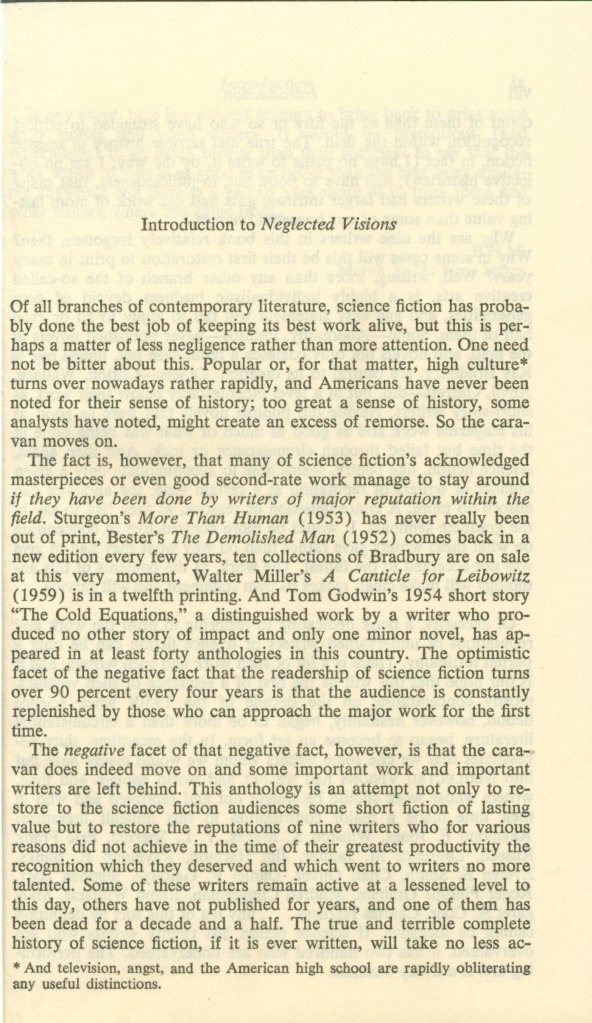
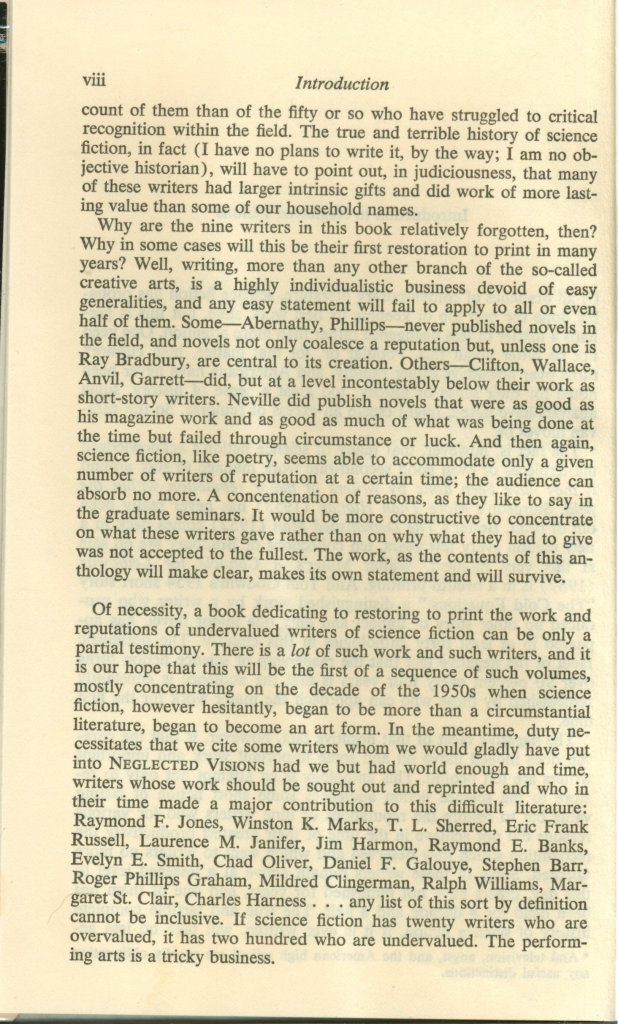

Unfortunately, Mark Clifton seems to be mostly out of print. You can find his original magazine publications using ISFDB and Archive.com. However, Amazon does have The Second Golden Age of Science Fiction MEGAPACK ®: Mark Clifton for 99 cents. It doesn’t have “Clerical Error,” but it does have a handful of stories and a couple of serials. In 2020 Dover published What Have I Done?: The Stories of Mark Clifton. The paperback is currently $7.48 for 288 pages, but the ebook is $3.99 but claims to only have 21 pages. That worries me. It appears to only be the first story.
James Wallace Harris 11/30/23
Nice 👌
LikeLike
SciFiction published a lot of original fiction, more than it did reprint iirc: ARCHIVE
| | | | | |
|
| | | | ARCHIVE
|
|
|
LikeLike
I still don’t think Clerical Error is a science fiction story. There’s nothing in that story that makes it science fiction. It’s just a story with lots of info dumping and philosophical musings. I would have been better for Clifton to write an essay and not try to fold all that information into a story.
LikeLiked by 1 person
That’s true. It’s not science fiction, at best it’s fiction about science. And what Clifton had to say would have been easier to understand as an essay. Kingston solution isn’t very believable either. So, the plotting is weak too.
It really is a jumble of a story that takes work to straighten out.
But I still liked Clifton’s effort. I could feel this aging writer struggling to express himself. Clifton would be dead in another seven years. So my liking of the story might be for the man who wrote it and why he wrote it.
LikeLike